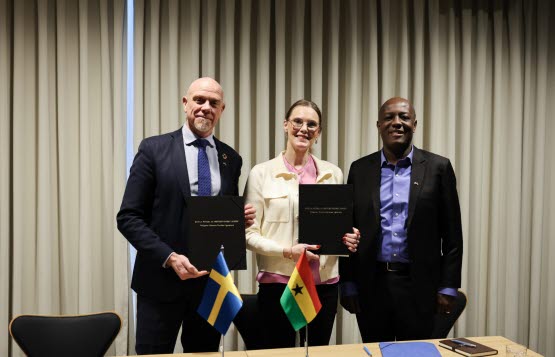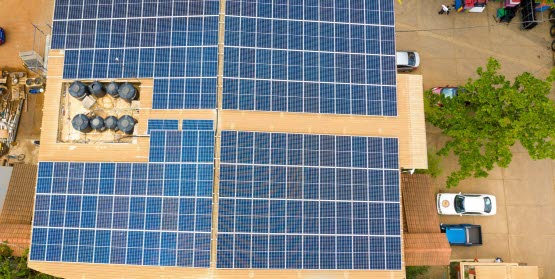Sweden finances project in Ghana to accelerate the energy transition
Less than one percent of Ghana's electricity production comes from solar energy. Sweden is about to finance a project that increases that share - and helps accelerate the transition to a sustainable energy system.

Robert Andrén, Director General of the Swedish Energy Agency together with the CEO of Stella Futura in Sweden, Ulrika Tornerefelt, and the CEO of Stella Futura in Ghana, Francis Asante.
Since 2021, Sweden has a memorandum of understanding with Ghana to enter into bilateral climate cooperation under the Paris Agreement. The Swedish Energy Agency now announces that Sweden will soon start implementation of its first mitigation activity in the country.
Robert Andrén, Director General of the Swedish Energy Agency, states that the project will increase Ghana's electricity production from solar energy, accelerating the country's transition to a sustainable energy system:
"The Swedish Energy Agency is proud that Sweden will be one of the first countries to walk the talk of the Paris Agreement. The project will act as an important proof-of-concept supporting the development of both Ghana’s and Sweden’s implementation of the Paris Agreement."
Installation of solar with battery storage
The project will lead to the installation of roof-mounted solar panels with battery storage for commercial and industrial facilities across Ghana. This will displace the use of diesel-powered backup generators and grid electricity, reducing emissions by approximately 165 000 metric tons of CO2e by 2030.

A similar solar panel project in Ghana. Photo: Stella Futura
Sandra Lindström, Head of International Climate Cooperation at the Swedish Energy Agency states that the project will provide a stable and clean source of electricity while creating both employment and education tailored to female workers. Sandra Lindström continues;
“Despite Ghana´s sunny climate, the uptake of solar has been slow due to high capital costs and the need for long term investments. Ghana currently has less than one percent solar energy in its electricity mix. With access to carbon finance through climate cooperation in line with the Paris Agreement, the uptake of solar energy and energy storage in Ghana can be accelerated”.
The project in Ghana is the first Swedish project that goes through procurement to implementation under the Paris Agreement framework. Sweden has previously financed similar international climate projects under the Kyoto Protocol.


